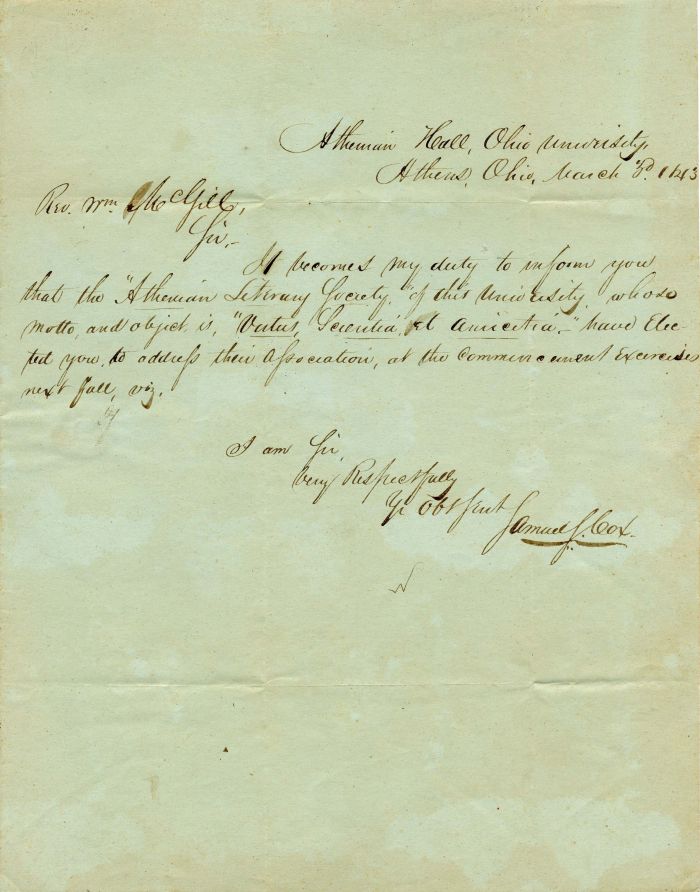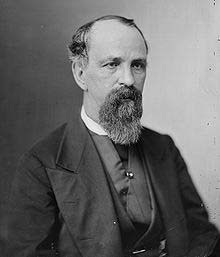Autographed Letter signed by Samuel S. Cox
Inv# AU1420
ALS signed by Samuel S. Cox.

Samuel Sullivan "Sunset" Cox (September 30, 1824, Zanesville, Ohio – September 10, 1889, New York City) was an American Congressman and diplomat. He represented both Ohio and New York in the United States House of Representatives, and also served as United States Ambassador to the Ottoman Empire. Cox was the grandson of New Jersey Congressman James Cox. He was named for his maternal grandfather, Samuel Sullivan, who was Ohio State Treasurer in 1820–1823. Cox attended Ohio University and Brown University, graduating from Brown in 1846. He practiced law in Zanesville and became the owner and editor of the Ohio Statesman, a newspaper in Columbus, Ohio. In 1855, he was secretary of the U.S. legation to Peru. Cox was elected to Congress as a Democrat in 1856, and served three terms representing Ohio's 12th congressional district and one representing the 7th district. After giving an impassioned speech in 1864 denouncing Republicans for allegedly supporting miscegenation (see miscegenation hoax), he was defeated for reelection and moved to New York City, where he resumed law practice. "As slavery was already dead by the bullet, I figured it would be better to stop the bloodshed," he told a crowd seven years later. That mattered more than "the mere empty, abstract ceremonial of burying the dead corpse of slavery." He returned to Congress after winning election in 1868 to New York's 6th congressional district. He served two terms, was defeated by Lyman Tremain in the New York state election, 1872, running for Congress at-large on the state ticket, but was elected to the vacant Congressional seat of the late James Brooks in 1873. Cox was then re-elected six times. In May 1885, Cox resigned his Congressional seat to accept appointment by President Grover Cleveland as U.S. Ambassador to the Ottoman Empire, succeeding Lew Wallace. After serving for a year as Ambassador, he ran for Congress yet again, in a special election to fill the term of Joseph Pulitzer, who had resigned his seat; Cox was once again elected and served from the lower west side of Manhattan until his death on September 10, 1889. During his last term, he was chairman of the House Democratic Caucus.
Tammany Hall elected Cox to Congress in New York, and it kept him there, but he was never part of the stealing. "Mr. Cox is ... almost the only honest man I know who passed through a portion of the Tweed Ring period," another politician said later. Cox was a supporter of civil service reform and westward expansion. In 1858, he was one of the Democrats who broke with the Buchanan White House and opposed admitting Kansas as a state under the Lecompton Constitution. Later, he became a powerful critic of high tariffs — a stand that played well with his merchant constituents in a leading commercial city — and a supporter of railroad regulation. Whimsically, he suggested that those keeping the high tariff duty on coal should lay a heavy duty on the sun, as a dangerous competitor in warming people up. COX STATUE, IN ASTOR PLACE He was a backer of the Life Saving Service, later merged into the United States Coast Guard. He was also known as the "letter carriers' friend" because of his support for paid benefits and a 40-hour work week for U.S. Post Office employees. In gratitude, postal workers raised $10,000 in 1891 to erect a memorial statue to Cox in New York City. Made by sculptor Louise Lawson, it was originally placed near his home on East 12th Street but was later moved to its present location in Tompkins Square Park. It depicts Cox orating and has been criticized as a poor likeness. He was known as an eloquent public speaker, though his wife wrote many of his speeches. His nickname "Sunset" came from a particularly florid description of a sunset in an article in the Ohio Statesman. James H. Baker, then the editor of the Scioto Gazette, a Whig newspaper in Chillicothe, gave him the title "by reason of a highly wrought and sophomoric editorial on a flaming sunset after a great storm." Cox wrote several books including Why We Laugh, A Buckeye Abroad (1852), Eight years in Congress, from 1857 to 1865 (1865) and Three Decades of Federal Legislation, 1855-1885 (1885). His colleagues appreciated him most for his ready sense of humor, usually gentle rather than cutting. Indeed, some of them thought that his joking quality may have kept him from becoming Speaker of the House, because, for all his hard work and studious habits, he was not taken seriously. "In his political action he seemed more anxious to annoy his opponents than to extinguish them," Congressman George S. Boutwell of Massachusetts wrote, in a typical dismissal. "His speeches were short, pointed and entertaining. He was a favorite with the House, but his influence upon its action was very slight. Those who acquire and retain power are the earnest and persistent men. When Cox had made his speech and expended his jokes he was content. The fate of a measure did not much disturb or even concern him." Others who served longer with him realized that Cox also had the grit and parliamentary skill to make a formidable adversary in debate. Speaker of the House Thomas Brackett Reed said, "in action he was a whole skirmish line, and has covered more movements of the Democratic party, and led it out of more parliamentary pitfalls than any of its orators and all its leaders put together.









Ebay ID: labarre_galleries